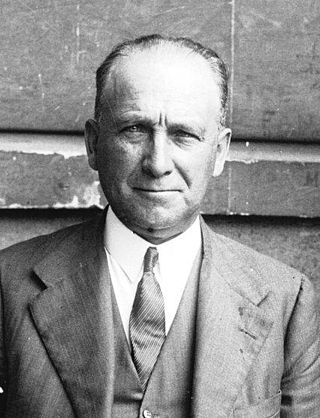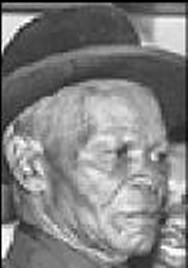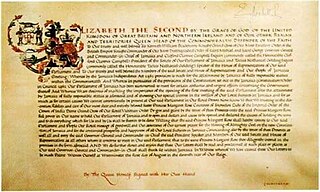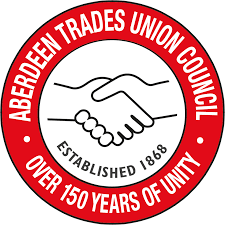Related Research Articles

Francisco Largo Caballero was a Spanish politician and trade unionist. He was one of the historic leaders of the Spanish Socialist Workers' Party (PSOE) and of the Workers' General Union (UGT). In 1936 and 1937 Caballero served as the Prime Minister of the Second Spanish Republic during the Spanish Civil War.

Sir William Alexander Clarke Bustamante was a Jamaican politician and labour leader, who, in 1962, became the first prime minister of Jamaica.
The Jamaica Labour Party (JLP) is one of the two major political parties in Jamaica, the other being the People's National Party (PNP). While its name might suggest that it is a social democratic party, the JLP is actually a conservative party.

Hugh Lawson Shearer was a Jamaican trade unionist and politician, who served as the 3rd Prime Minister of Jamaica, from 1967 to 1972.
The West Indies Democratic Labour Party (DLP) or Democrats was one of two Federal parties in the short-lived West Indies Federation, the other being the West Indies Federal Labour Party (WIFLP). The party was organised by Sir Alexander Bustamante to counter the WIFLP led by his cousin Norman Manley. In the 1958 West Indies federal elections, the party lost, winning 19 of the 45 seats in the Federal Parliament of the West Indies Federation.
The Jamaica Confederation of Trade Unions (JCTU) is a national trade union center in Jamaica. It is affiliated to the International Trade Union Confederation.
The Bustamante Industrial Trade Union is a trade union center in Jamaica established by Sir Alexander Bustamante.
The Jamaica Association of Local Government Officers (JALGO) is a 5,000-member public sector trade union in Jamaica which represents workers in local and national government, governmental corporations, quasi-government bodies and other agencies created by statute. Its members are non-supervisory personnel and include fire-fighters with the Jamaica Fire Brigade, workers at the National Water Commission, non-nursing personnel in the health service, non-teachers in the schools, workers at the National Irrigation Commission and government employees in the 13 Parish Councils.

William Wellington Wellwood Grant OD was a Jamaican labour activist. He was known as "St. William Grant", "St." presumably meaning "Sergeant" in reference to his military or UNIA service.
A series of workplace disturbances, strikes, and riots broke out across the British West Indies in the period between 1934 and 1939. These began as the Great Depression wore on and ceased on the eve of World War II. The unrest served to highlight inequalities of wealth, led the British government to attempt a solution to the problem, and in some cases spurred the development of indigenous party politics that would lead to self-government and independence in the postwar period.
The Trade Union Congress is a general trade union in Jamaica. Initially organised as a trade union council to be the labour wing of the People's National Party (PNP) in 1943, the organisation split in 1952 with the formation of the National Workers Union. The TUC was a founding member of the Jamaica Confederation of Trade Unions.
Gladys Maud, Lady Bustamante, OJ was a Jamaican workers' and women's rights activist and wife of Sir Alexander Bustamante, Jamaica's first Prime Minister. She was a prominent member of the Jamaican trade union movement, and was affectionately known as "Lady B".

The Crown Colony of Jamaica and Dependencies was a British colony from 1655, when it was captured by the English Protectorate from the Spanish Empire. Jamaica became a British colony from 1707 and a Crown colony in 1866. The Colony was primarily used for sugarcane production, and experienced many slave rebellions over the course of British rule. Jamaica was granted independence in 1962.
Richard Hart was a Jamaican historian, solicitor and politician. He was a founding member of the People's National Party (PNP) and one of the pioneers of Marxism in Jamaica. He played an important role in Jamaican politics in the years leading up to Independence in 1962. He subsequently was based in Guyana for two years, before relocating to London in 1965, working as a solicitor and co-founding the campaigning organisation Caribbean Labour Solidarity in 1974. He went on to serve as attorney-general in Grenada under the People's Revolutionary Government in 1983. He spent the latter years of his life in the UK, where he died in Bristol.
Allan George St Claver Coombs was a Jamaican trade unionist.

The Colony of Jamaica gained independence from the United Kingdom on 6 August 1962. In Jamaica, this date is celebrated as Independence Day, a national holiday.

Norman Washington Manley was a Jamaican statesman who served as the first and only Premier of Jamaica. A Rhodes Scholar, Manley became one of Jamaica's leading lawyers in the 1920s. Manley was an advocate of universal suffrage, which was granted by the British colonial government to the colony in 1944.
The United Textile Workers of America (UTW) was a North American trade union established in 1901.

Aberdeen Trades Union Council (ATUC) is the body made up of affiliated trade union branches and organisations working in the Aberdeen and Aberdeenshire area to promote the interests of workers in the region. The ATUC provides services to affiliated branches on a wide range of industrial, social and community issues and is affiliated to the STUC. It has an office based in Aberdeen, Scotland.
The Jamaican Federation of Labour was a national trade union federation bringing together trade unions in Jamaica.
References
- 1 2 3 4 Alexander, Robert J. (2004). A History of Organized Labor in the English-Speaking West Indies. Westport, Connecticut: Praeger. ISBN 0275977439.
- ↑ Hart, Richard (1999). Towards Decolonisation: Political, Labour and Economic Developments in Jamaica 1938-1945. Canoe Press. ISBN 9789768125330.